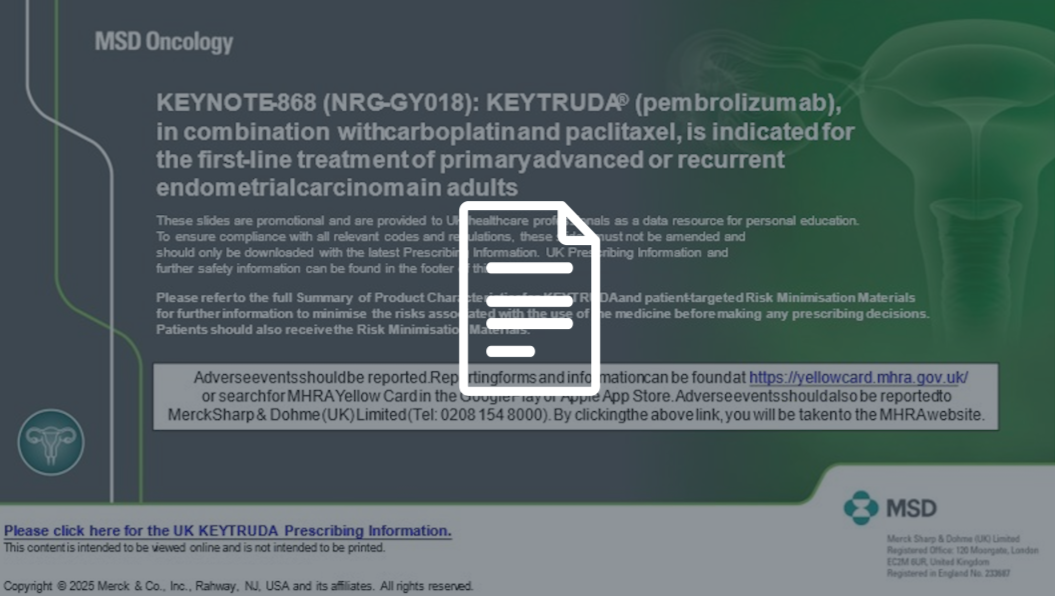KEYTRUDA (pembrolizumab) with chemotherapy in endometrial cancer
KEYTRUDA® (pembrolizumab) with chemotherapy in endometrial cancer
Prescribing Information (United Kingdom) [External link]
KEYTRUDA, in combination with carboplatin and paclitaxel, is indicated for the following:
| Advanced or recurrent endometrial carcinoma | |
|---|---|
| For use in | The first-line treatment of primary advanced or recurrent endometrial carcinoma in adults.1 |
| Dosing schedule | For first-line treatment of primary advanced or recurrent endometrial carcinoma, the recommended dose of KEYTRUDA is 200 mg every 3 weeks for 6 cycles in combination with chemotherapy, followed by KEYTRUDA 400 mg every 6 weeks for up to 14 cycles as monotherapy.1 |
| Duration of treatment | In the KEYNOTE-868 (NRG-GY018) trial, treatment continued until disease progression, unacceptable toxicity, or a maximum of 20 cycles (up to approximately 24 months) |
| Clinical trial | KEYNOTE-868 (NRG-GY018) was a randomised, multicentre, double-blind, placebo-controlled study in patients with advanced or recurrent endometrial carcinoma, including those with dMMR and pMMR tumours. The trial was designed to assess statistical significance in both pMMR and dMMR tumours, independently.1,2 Patients had not received prior systemic therapy or had received prior chemotherapy in the adjuvant setting. Patients who had received prior adjuvant chemotherapy were eligible if their chemotherapy-free interval was at least 12 months. Patients with endometrial sarcoma, including carcinosarcoma or patients with active autoimmune disease or a medical condition that required immunosuppression were ineligible.1,2 Patients were assigned in a 1:1 ratio to receive paclitaxel plus carboplatin along with either pembrolizumab or placebo for every three weeks for 6 cycles, which was followed by pembrolizumab or placebo maintenance every 6 weeks for up to 14 cycles.  Click here to view KEYNOTE-868 (NRG-GY018) clinical data presentation. View |
Refer to the Summary of Product Characteristics and Risk Minimisation materials available on the emc website before prescribing, in order to help reduce the risk associated with KEYTRUDA.
Abbreviations:
pMMR: proficient mismatch repair; dMMR: deficient mismatch repair.
References
- KEYTRUDA Summary of Product Characteristics.
- Eskander R et al. Pembrolizumab plus Chemotherapy in Advanced Endometrial Cancer N Engl J Med. 2023;388:2159-2170
Supporting documentation
Prescribing Information (United Kingdom) [External link]
By clicking the link above you will leave the MSD Connect website and be taken to the emc PI portal website.
